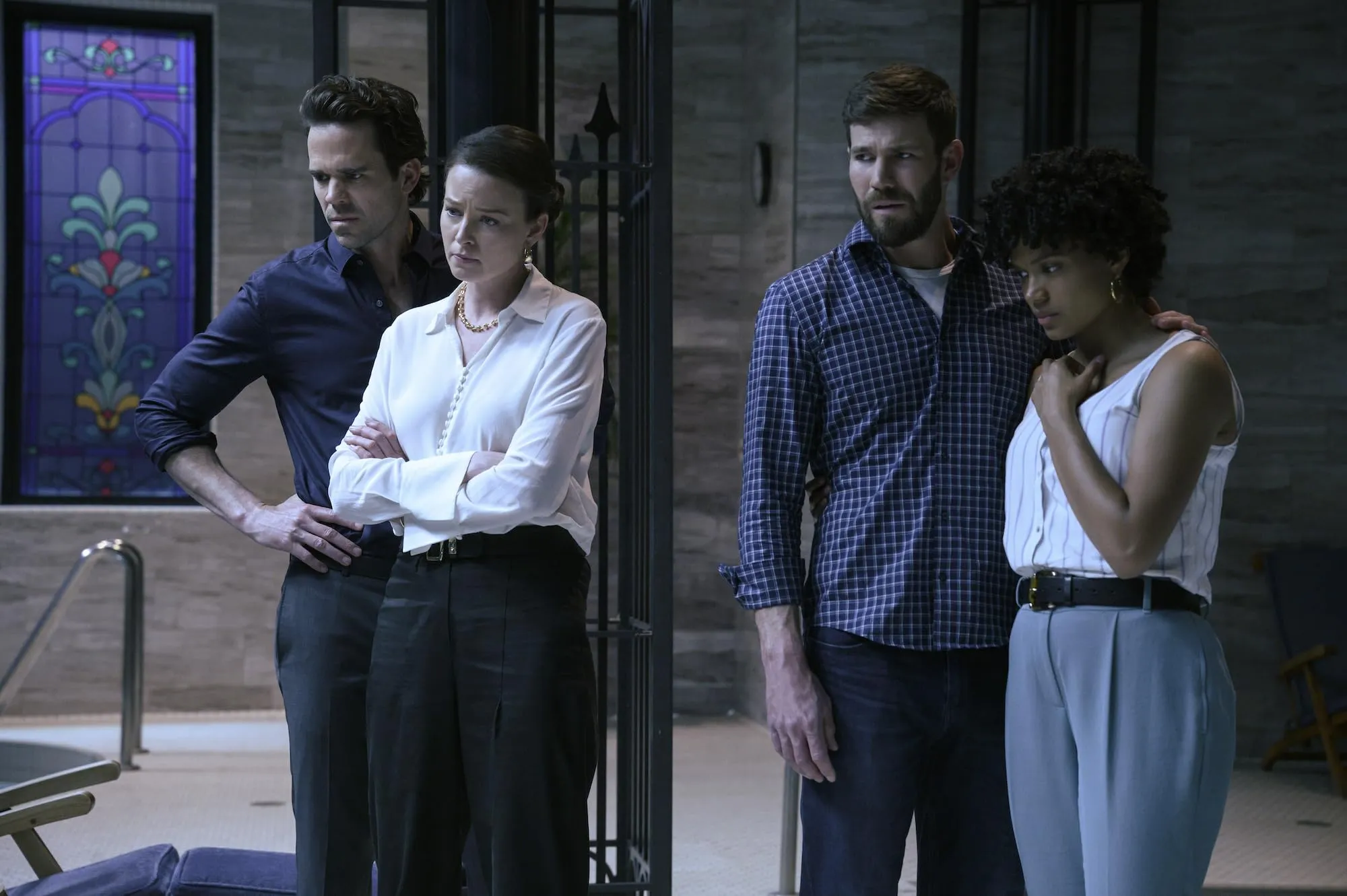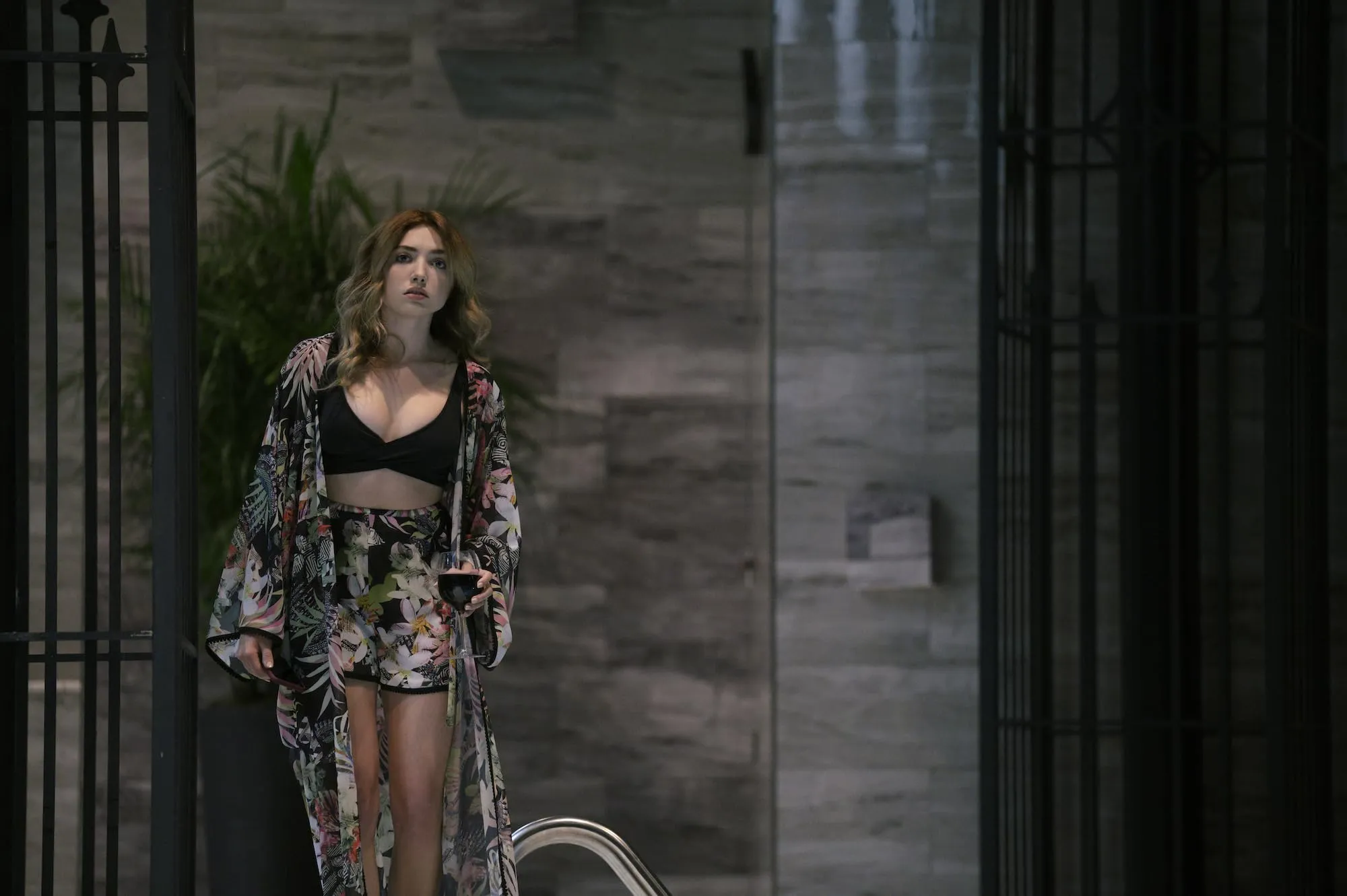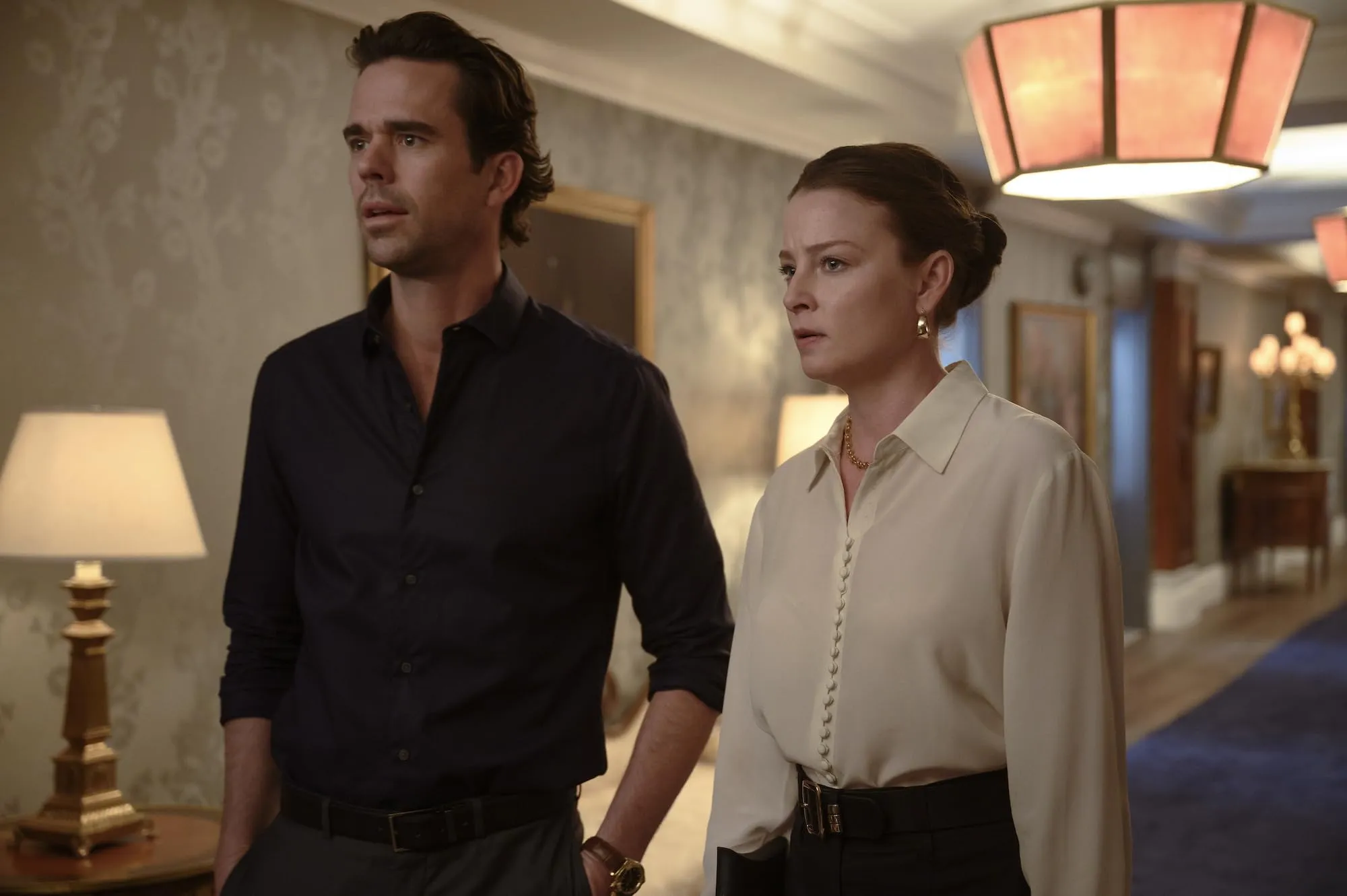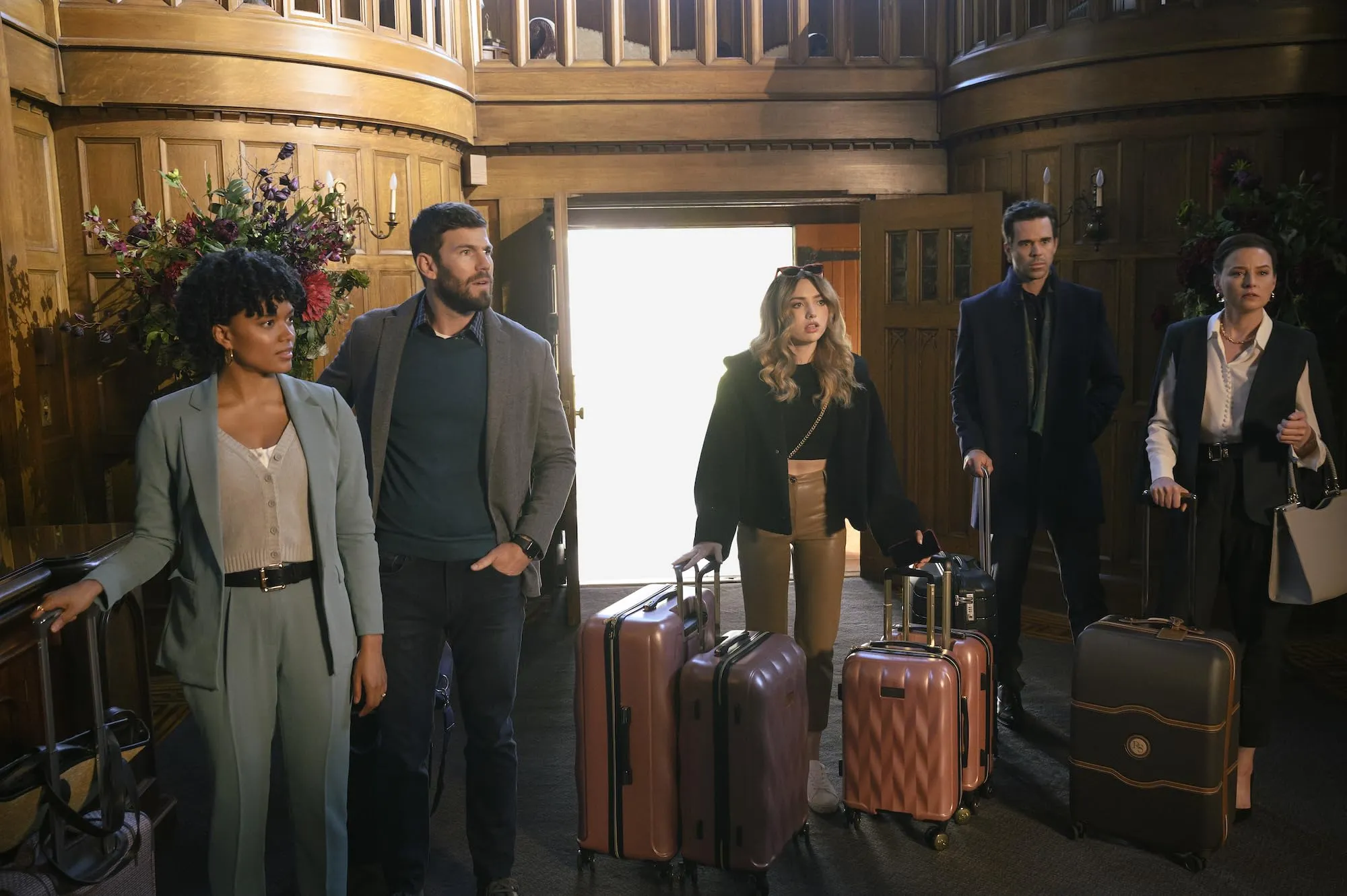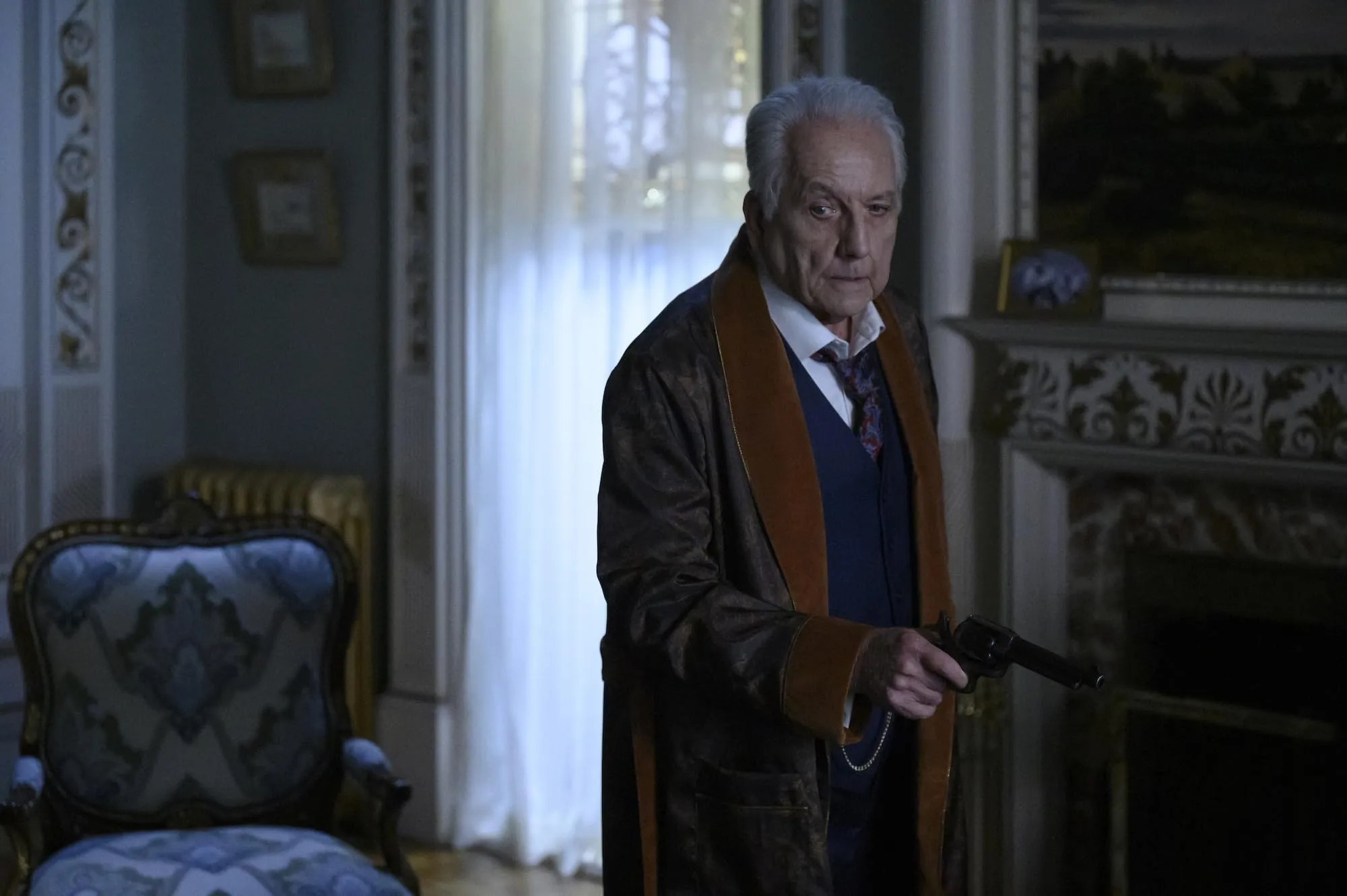Billionaire patriarch Charles Abernathy had an unusual evening planned for his four adult children. Assembling them at his spooky mansion, heir to an old fortune, he dropped a bombshell—someone aimed to murder him by dawn’s first light.
Protecting their papa against this mysterious threat, the siblings just might inherit his two billion-dollar estate. But fail, and it would pass to charity instead. With the doors locked until morning, it was game on in a night of nerves and mystery.
Directed by Alejandro Brugués and starring veteran actor Bob Gunton as the paranoid Charles, The Inheritance pits family bonds against greed as his sons and daughters try surviving the night. We have golden boy Drew, brought with trusting wife Hannah for support. Siblings Madeline and CJ eye the cash with selfish schemes. And social media star Kami livestreams it all for online fame.
Unknown enemies lurk within bricked walls, as does the strange history of Charles’ privileged but pressure-filled clan. Over suspenseful hours, truths will emerge and legacies will be threatened, in a dilemma of high-stakes horror and personal drama. With everyone suspect and no one beyond risk, the Abernathy name is in for a chaotic inheritance battle royale.
Inheritance Personalities
The characters of The Inheritance are an integral part of what makes this horror premise work—or not work, as the case may be. At the head of the family we have billionaire patriarch Charles Abernathy, played grizzled yet guarded by veteran actor Bob Gunton.
Clearly harboring some heavy secrets and suspicions, Charles sets this night of danger in motion but reveals little of why. This mysterious motivation is fitting considering the character, though ultimately leaves viewers wanting more resolved answers.
Charles’ four children each bring their own personality but lack depth. Golden boy Drew just wants to please, while wife Hannah solely supports him. Madeline and CJ eye the cash with selfish schemes yet differ little besides that. And social media maven Kami, portrayed competently by Cobra Kai’s Peyton List, serves mainly as livestreaming fodder. Their interactions tend to be stilted and advance the plot in a mechanical “idiotic” fashion at times.
But where these characters truly struggle is believable decision-making. Faced with the dire circumstances of someone aiming to murder dad tonight, the Abernathy heirs react with a confounding lack of pressing questions and urgent action. One would press Charles for valid explanations rather than accept his vague words at face value while the lives of all hang in the balance. Their behavior breeds a disconnect that holds the story back from being fully compelling.
While the acting capabilities of leads like Gunton are put to capable use, the weak characters they’re given remain shallow tropes that never evolve past superficial backgrounds. Their stagnancy and tendency to progress the plot in nonsensical ways becomes a hindrance difficult to overlook. With more dimensional personalities and realistic motivations, this thriller of family secrets and greed may have stood a stronger chance at success.
An Inherited Formula
The Inheritance relies on a familiar setup that echoes many a haunted house horror before it—and doesn’t offer much new in the plot department. Charles gathers the clan to his mysterious warning, and a creepy evening of danger begins predictably enough. From there, the formula marches on as characters split up, secrets surface, and perils arise in regularly spaced intervals.
While this structure maintains a steady stream of scares and revelations, it lacks true suspense or surprise. Every moment plays out like a checklist of expected tropes. The foreshadowing aims to unsettle but telegraphs shocks long before. Even plot twists feel perfunctory instead of organic surprises.
The dialogue stumbles too often, lurching from evasive exposition to melodrama without nuance. It tells more than shows relationships and backstories, leaving personalities paper thin. With richer interactions between complex individuals, this skeletal script could have explored its family themes in a meaningful manner.
A tighter focus on Charles’ real motives and the family’s messy history may have optimized this high-concept premise. As is, the cast remains lifeless receptors for the script’s routine turns rather than active shapers of an unpredictable storm of domestic horror. Their acceptance of vague threats and half-answers strains credibility.
Potential for layered social commentary on inheritance, secrets, and familial complexities goes untapped. What’s left plays like the greatest hits of haunted house tropes strewn together without crafting a true style of its own. When the final frame arrives, there’s no lingering chill—just checking items off a well-worn checklist.
Inheritance Imagery
Director Alejandro Brugués brings a capable eye, with some haunting images that elevate The Inheritance above its lacking story. Where the script falls flat, his stylistic vision comes to the fore—for a time.
Brugués demonstrates a knack for crafting unsettling atmospherics. His framing plays on light and shadow to maximum eerie effect. Tight corridors and yawning rooms take on a foreboding quality under his watch. Suspenseful stalking sequences are shot with an artful hand, letting fluid camerawork heighten the tension thread by thread.
Visceral practical effects impress, grounding supernatural chills in gritty realism. One cringe-inducing kitchen scene stands out—a gruesome display executed with grizzly gusto. Even amid constraints, grisly revelations are portrayed in a disturbingly delightful fashion.
Yet as cookie-cutter plot points overwhelm, Brugués’ directorial talents are held back. His visual eye can only elevate generic jump scares and apparitions so far. While maintaining moody ambiance, true fright falls by the wayside.
Cinematography thrives in shadowy obscurity but lacks defining flair of its own. Though handsomely framed, the eyeline remains safely derivative. Atmospheric prowess fails to evolve into a signature style.
Brugués’ hand promises greatness, with an intuitive understanding of manipulating fear through framing techniques. But like the cast, he’s hamstrung by weak source material. Individual sequences shine, yet fail elevating the entire piece to its nightmare potential. With a script matching his visual aptitude, Brugués’ could craft a horror to remember.
Inherited Environments
The Abernathy mansion stands central as the film’s haunting heart. Grand scale establishes patriarch Charles’ wealth and isolation, while ornate details give insight into fragmented family history.
Lavish rooms hold countless curiosities to feast on visual discovery. Yet their sheer number remains untapped potential. Wider establishing shots showcase sprawling layout but confine intimacy to tighter corridors. Secrets hide round countless corners left untapped.
Production values flesh settings into dimensional worlds. Authentic costumery and practical furnishings populate spaces with care. But overcrowded décor muffles vitality, stifling a defining aesthetic. Subtler suggestions could deeper burrow emotion.
Sound too amplifies eeriness. Creaks and whispers drift halls with unnerving authenticity. But score opts bombastic where nuance better unsettles. Technical aspects achieve quality yet lack collaborative cohesion to consistently distress.
Special effects showcase pioneering craft. Graphic moments root supernatural unease in real viscera. Yet reliant gore risks sensationalism over subtlety. Scaled-back chills through suggestion better access collective nightmares.
Potent environments beg fuller exploration. Tantalizing spaces imply untold histories just out of sight. But confined wandering inhibits their spellbinding potential. With pathways left undiscovered, fuller mysteries of a family’s past remain inherited but untouched.
Inherited Issues
The Inheritance aims to dig deeper than mere cheap thrills, with musings on family ties, fortune, and fractured psyches under the surface. Does it succeed at meaningful thematic commentary or settle for superficial social soundbytes?
On a base level, daddy’s dollars stir sibling rivalries in predictable ways. Money motivates schemes as greed overtakes grief. Yet deeper discussions on privilege, ownership, and how wealth warps relationships remain too superficial. No character perspective truly critiques class dynamics.
Mental stability also arises, but fleetingly. What drives Charles’ unstable actions, suspicion of kin? Generational trauma hints yet go unexplored. As plot overshadows people, dysfunctional roots receive shallow scrutiny at best.
Where rich social satire could reside through dug-in character dysfunction, clichéd tropes instead dominate. Dissecting toxicity within elite circles, impact of fortune on familial fortress, how inheritance warps humanity—opportunities exist but go unused.
With character-driven reimagining, unsettling humanity beneath lurid imagery may evolve this work. As superficial commentary and derivative scares now define it, resonating reflections on relations and money’s corrosion stay untapped. Deeper inspection of internal demons haunting even the most affluent of lineages could burrow terror into viewers’ intricate worlds.
The Inheritance poses provocative ideas yet struggles with meaningful commentary. Surface-scraping themes fail to provoke thought beyond shallow shocks. Substance under style leaves inheritors wishing for deeper discernment on family, fortune, and sanity from such a promising dark premise.
Final Assessments
The Inheritance had the potential to unsettle with its haunting premise of danger within privileged family walls. At moments, it comes close—solid star turns and unnerving visual sequences show glimpses of atmospheric intrigue. But ultimately, weaknesses outweigh strengths.
Chief faults stem from stale characters lacking depth or nuance. Their nonsensical actions propel events in mechanical, “idiotic” ways. Meager effort maximizes dramatic potential or social commentary. As a result, plot points emerge predictable, rote reveals providing little lasting chills.
While atmospheric filmmaking elevates sections, Brugués’ artistic eye can only lift material so far. With more engaging personas woven into intricately eerie plotlines, this might have burrowed deeper under viewers’ skins. As is, glimpses intrigue without satisfying full potential.
Occasional engaging performances or creepy imagery prove sporadic bright spots in a largely formulaic game of survival tropes. Though craftsmanship aimed higher, outputs feel assembly line fodder more than meaningful marital melodrama.
Unless thrill-seeking exploits of clumsy writing fly, larger audiences will find scant substance beyond jump scares. Genre aficionados may appreciate fleeting entertainment value. But better horror haunts await those craving imaginative social insight mixed with memorable macabre. This inheritance proves ultimately not worth the hassle.
The Review
The Inheritance
The Inheritance had promise to unsettle with its stygian setting and notions of interpersonal discord darkening family gates. But superficial characterization and a derivative, foreseeable plotline undermine chances to deeply disturb. Glimpses of unnerving visual and acting talent shine through, yet inconsistent execution and a lack of insight into pressing themes diminish lasting resonance. While sporadic thrills may please dedicated genre fans, larger audiences will find scant satisfaction beyond intermittent shocks.
PROS
- The intriguing premise of family secrets unleashed in a haunting mansion setting
- Solid lead performance from Bob Gunton as patriarch Charles Abernathy
- Individual scenes of unnerving atmosphere and creepy practical effects
CONS
- One-dimensional, trope-filled characters that lack believability
- Predictable, derivative plot with minimal plot twists or social commentary
- Stilted dialogue and loose connections between plot points









































